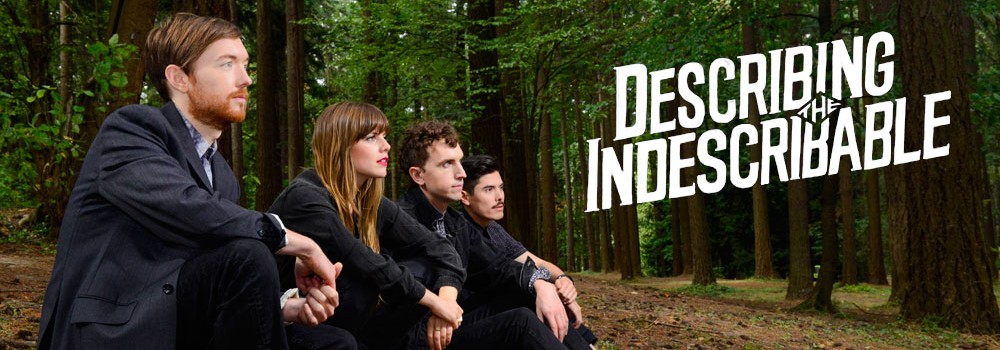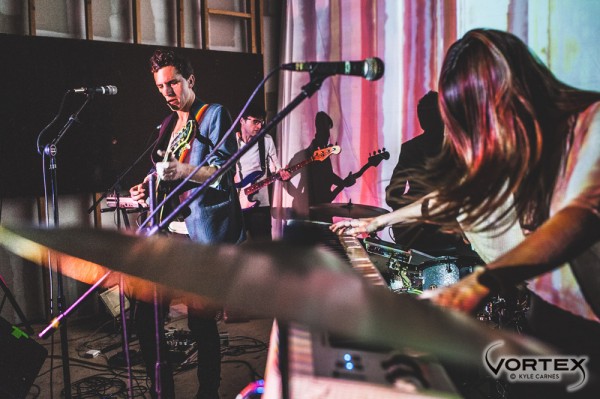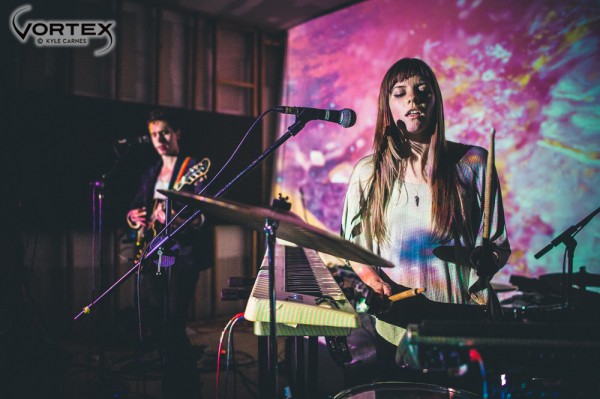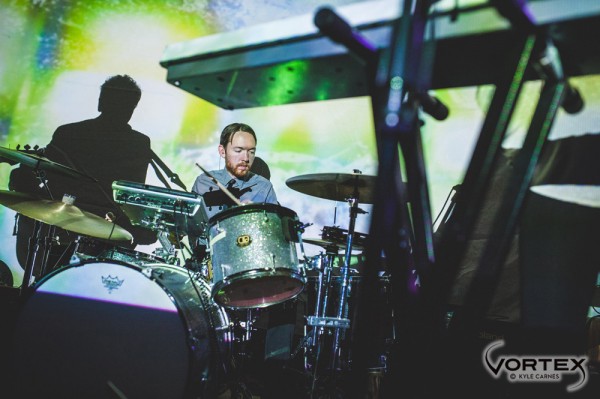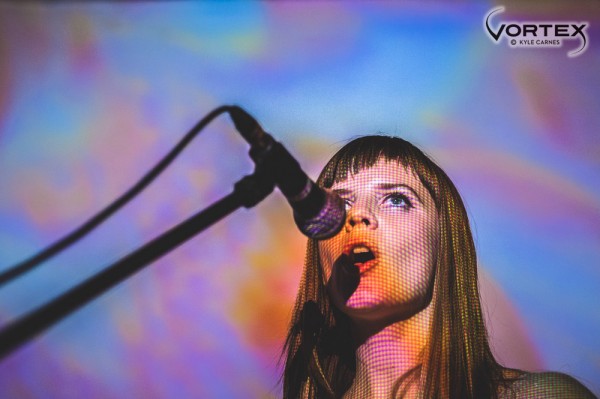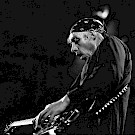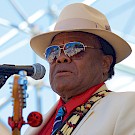"I know that not everybody gets this feeling but, from time to time, I personally feel that there’s more going on than you can see,” Matt Sheehy muses.
“And science is a really great way to try to dig down deeper but you don’t always get there that way,” explains the man who’s a forester for Northwest Forestry Services and the creative guide ushering his intricate, modern-yet-’80s-esque pop band Lost Lander toward new musical and personal exploration.
“Coming through the death process with somebody, you start to see that maybe there’s more going on there too,” he says. “In my case, my mother was for sure seeing it more than anybody I’d ever known.”
Trailing off when pressed for what it is, keyboard player and vocalist Sarah Fennell jumps in: “It’s spiritual,” she simply states.
“There’s more than the eye can see,” Sheehy continues. “When we’re making music and when I’m writing songs, I try really hard to come up with melodies—combinations of sounds—and then there’ll be a moment where I start to get that same feeling—like something’s going on here and it’s greater than the sum of its parts. It feels cosmic. For me, that’s a big indicator that I’m on the right track: when I start to get the feeling that the indescribable is starting to be described—a little bit.”
 Lost Landers: Patrick Hughes, Matt Sheehy, Bill Marsh and Sarah Fennell. Photo by Kyle Carnes
Lost Landers: Patrick Hughes, Matt Sheehy, Bill Marsh and Sarah Fennell. Photo by Kyle Carnes
Lost Lander’s debut record, DRRT, was grounded by probing the connection between nature and technology—the process of two men (Ramona Falls’ Brent Knopf alongside Sheehy) creating a wholly organic sound from a completely inorganic approach. While Medallion adheres to the same collage approach—simply with more musical minds at work—its examination moves from the physical world to the spiritual one.
And although life comes and goes, traces of it in various forms are passed down for generations. Since the early days of Lost Lander, Fennell has worn her grandmother’s glitzy medallions onstage and today is no exception: “This locket is my great, great-grandmother’s,” she reveals.
Its physical presence establishes a continuous through line between the generations of female figures in her family, aided by the fact that the women in the Fennell clan are very close and keep the histories of previous individuals alive, so much so that even Sheehy recognizes that “the stories get passed down matriarchally” in her family.
“The imagery, and also some of the stories of the songs, are playing with this contrast between the substantial and the ephemeral,” Sheehy explains. “The idea being that the medallion is like an heirloom that gets passed down through generations. Each generation itself is ephemeral, but then there’s this unchanging element. It’s sort of like a life force.”
Sheehy lost his mother in 2011 after the recording but before the release of Lost Lander’s first album and that reality led to “a lot of thinking about mortality,” he says. The songs on Medallion “aren’t fixated on death but I think they are fixated on thinking about the temporariness of things.”
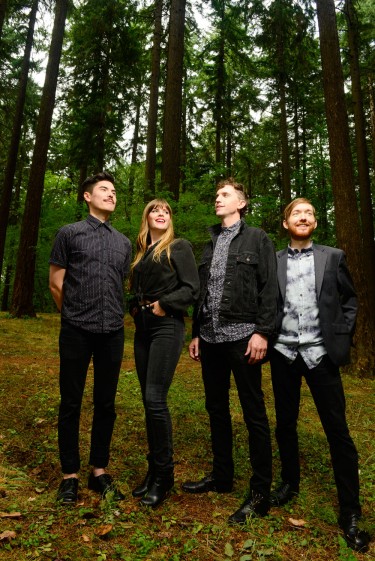 Marsh, Fennell, Sheehy and Hughes: Photo by Anthony PidgeonAnd memorializing moments.
Marsh, Fennell, Sheehy and Hughes: Photo by Anthony PidgeonAnd memorializing moments.
Encouraging experimentation, Sheehy initially got the ball rolling on the band’s second effort with a very dance-oriented “vision board.” Using artists like Peter Gabriel, Kate Bush, George Michael, Phil Collins, Robyn, Justin Timberlake and Bill Withers as starting points, the album conveys darker themes brightened by brilliant, modernized ’80s pop. At times new wavey, yet accented by the disparate notes of contemporary electronics and the classic sounds of a gospel-infused organ or violin (provided by Luke Price) or brass (thanks to Kelly Pratt), “each song contains its own little style in it,” describes drummer Patrick Hughes. “Each nods to different genres and I’ve never felt like there was something we couldn’t or shouldn’t do.”
More than an inspiration, Sheehy’s mother is also responsible for the band’s name. As the burgeoning project was coming together, she was quite sick but nevertheless really excited to offer input. After failed attempts—like Sharp Marshmallow or the ultimate ’90s band name: Flying Sideways—Sheehy’s mom called him up and said she’d just had a dream about visiting Lost Land Lake, which she used to go to as a child, near her hometown of Chicago. She suggested, “What if you called your band Lost Lander?”
It was perfect.
Although the physical world can often feel intangible and hard to comprehend, the supernatural is even less known. Coming to a personal understanding requires analysis and Lost Lander dug into their roots and relationships, both past and present, for inspiration.
The four-piece—Sheehy, Fennell, Hughes and bassist Dave Lowensohn—may have lost a member as the making of Medallion came to a close (Lowensohn left to focus on his career and family) but picked up another one in the process.
Already employing snippets of the guitar skills of Bill Marsh (who also plays with the Shook Twins and Morning Ritual) on the new record, he was a natural choice to fill Lowensohn’s shoes. Plus, unbeknownst at the time, Fennell and him have deep roots.
“Bill’s father and my father both went to a private high school in Japan in the ’60s, but we met independently of that,” Fennell explains. “They were friends in high school, but we kind of reconnected them—kind of feels like family in a weird way.”
And so does the band. “We’re so much more emotional as a band because we’ve been a unit now for three-plus years,” Fennell says.
When Lost Lander came together in 2011, it was to reenvision Sheehy’s (with help from the aforementioned Knopf, formerly of Menomena) recording project for the stage. The pieces came together as the band members connected. Over time, they’ve only come to fit more snuggly. Establishing friendship and trust allowed the band to experience greater depths of emotion together, enabled them to explore deeper, more personal themes. Initiated individual growth.
Equipped Lost Lander to describe the indescribable—a little bit.
 Photo by Anthony Pidgeon
Photo by Anthony Pidgeon
“If I do something that I am shocked came from me,” Hughes starts, “that’s kind of in that same vein. If a moment sticks out in a really good way where I get chills, literally—when something like that happens while you’re creating, then you have to take that moment and keep it.” Like Sheehy, Hughes too sees this as a signal that he’s on the right track. “We tried to have the album full of those,” he says.
“Or as damn close as we could get,” Fennell adds.
“And I think we got pretty close,” Hughes assesses. The revision-heavy process—which, technically, involved a granular, complicated method of saving and sharing files amongst the group—lead to tracks eventually evolving to version 12.0 (and “that means we’ve opened that session 120 times so most of the songs got into triple digits version-wise,” Sheehy explains) and was all very democratic.
“A little too democratic,” Hughes jokes. “Someone was the secret dictator though,” he adds, glancing in Sheehy’s direction with a smirk.
“Someone has to be,” Fennell agrees. “Again, this album is different because of our emotional ties and connections as a group.”
Plus, when there were only two people involved on the first record, “the highest iteration number on any of the DRRT songs was 6.0,” Sheehy compares. Yet, Medallion “is a continuation of the same exploration,” he explains, “trying to pick at what’s at the surface and see what’s underneath.”
Whether coping with life and death, love and loss, the band acknowledges that they must face tough times in order to live life to the fullest. Sometimes you must literally “Give It Time,” as they sing on one of Medallion’s tracks, to gain perspective and ultimately overcome certain hardships. Working these things out together was “cathartic,” Fennell says, and allows Lost Lander to not close the book on a darker moment and forget about it—or worse, avoid it—but rather celebrate it.
“We hold out, for the feeling,” the band gloriously chants again and again at the close of “Sunburns” before Sheehy adds, “We gravitate together, we disintegrate together.”
For Sheehy, songwriting is often a way “to try to get something out of you,” recognizing that moments in life are sometimes “actually kind of tough to get through. It might’ve been a beautiful experience but it was hard,” he offers. “The idea is that it’s celebrating and, at the same time, trying to have fun with it.” And this mood is most definitely reflected in the aural experience Lost Lander generates—a buoyant brand of meticulously crafted pop. “This is something that feels fun, feels exciting in this unabashed way. We’re exploring more of those in the performance,” Sheehy says.
In reality, the new record was very much informed by the band’s live experiences—unlike the studio-based creation of DRRT. In an effort to unearth those ethereal, goosebump-inducing moments, live performances gave them perspective on “what were the things that were happening in the songs that got the whole room moving together,” Sheehy explains. “When things like that would start to happen on the new songs, I started gravitating more towards them.”
But it wasn’t just Sheehy’s efforts that conceived these moments. In addition to producer Knopf’s role of sounding board as well as literally scrambling arrangements—to both positive and repugnant effect—the entire process was intensely collaborative. Fennell realizes that the majority of the synth parts weren’t even of her creation, while Hughes contributed much more than just drums as well as assisted Sheehy lyrically.
More than a dozen other local musicians (including Sean Flinn, Dave Depper, Dana Janssen, Peter Condra, Papi Fimbres and even sister Shana Sheehy) contributed ideas—some of which may or may not have made the record, or whose final product may be unrecognizable from their original input. In fact, at the September listening party for Medallion at Mississippi Studios, Sheehy almost sheepishly provided a disclaimer before hitting play: thanking but asking their creative backers—many of them in attendance—not to be offended if they didn’t hear or didn’t recognize their contributions.
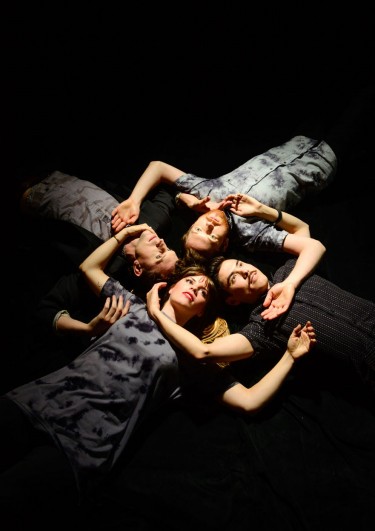 Photo by Anthony PidgeonThis crowdsourcing was an important part of Lost Lander’s collaging to create the record—gathering materials fueled their creative process. “We live in this amazingly robust community and there’s so much talent,” Sheehy says. “It just feels like it would be crazy not to try to tap it a little bit.”
Photo by Anthony PidgeonThis crowdsourcing was an important part of Lost Lander’s collaging to create the record—gathering materials fueled their creative process. “We live in this amazingly robust community and there’s so much talent,” Sheehy says. “It just feels like it would be crazy not to try to tap it a little bit.”
Plus, these people “are our web, our little community,” Fennell explains. Like any family tree, they’re also Lost Lander’s support network. “Maybe in some subliminal way, it’s having people we respect hear the music” and getting their affirmation that “it doesn’t suck!”
Although, Sheehy tentatively chuckles a little embarrassedly before revealing, “We probably put more hours than we needed to into this record—between all the workshopping and recording, [we] probably [made] 90 percent more music than was actually used.”
Yet, you never know what’s going to happen when you get talented individuals together in a room. “I’m a firm believer that the more ideas you have, and then if you try to distill it down to the very best ones, you can end up with something that feels exceptional,” he explains. “That’s how we’ve been operating.”
The search to find those “magic moments,” as Sheehy calls them, meant over-recording to find the two seconds of guitar that really worked. Case in point, he mentions that Kaki King played lap steel on “Feed The Fever”: “You know: wheeee?” he says, imitating the sound.
“That’s her?!” Hughes exclaims, genuinely surprised.
“Oh really?! Cool,” follows Fennell.
“I always liked that part and now I like it more,” Hughes mumbles, no doubt slightly overwhelmed envisioning all the other outside sonic contributions at once.
And contrary to popular belief, genius is rare. Perfection takes practice. To complete the package, Lost Lander prepared themselves by “exploring options,” Sheehy says, and exhausting as many possibilities as feasible, leaving confidence in its stead.
Hughes explains that instant success stories are so publicized because they’re so scarce—or they’re just trumped up for the entertainment of the public. Lost Lander’s game is a painstaking work ethic. “Maybe there really aren’t any geniuses out there,” Sheehy says. “There are just people that work really hard.”
But sometimes the simplest things achieve the most, which is exactly what Lost Lander does with the initial seconds of Medallion. The introductory “Pre” subduedly launches the record with the soft whistles and pops of fireworks beneath a few quiet synth notes. Yet, an immediate sense of nostalgia has been established—“a soundscape that will hopefully bring people back to childhood memories of watching fireworks,” Sheehy explains. He wants to take listeners to that place—“a warm summer night” with fireworks exploding in the night sky—“and then deliver” the spirited opening synths of “Gemini.”
Much like the fragile and fleeting remembrance of a Fourth of July past, the band protected the incubational moments that led to what you hear on Medallion.
“You don’t want to consider is this good or bad—you just want to think: Is this honest?” Sheehy contemplates.
The same can be said of the emotions conveyed by the record—whether positive or negative, they’re undoubtedly honest, facilitating growth.
“No one ever told me to not do something,” Hughes explains. “This band is good for me creatively because there’s not really a limit—if you want to expand in certain direction, I feel like there’s room to do that stylistically.”
“This might be the most joy I’ve experienced working on a record,” Knopf said at the September listening party, although the band laughs that “his definition of joy might be twisted.” But something they do agree with Knopf about is that it’s a record that exhibits “exuberance not tainted by fear,” in his words.
“I experienced that,” Fennell says. “There was fear and then it was like, whoa, breaking out.” Materializing as “a new strong, confident voice,” as Sheehy says, Fennell’s courage grew and showed itself with every burst of top-of-the-lungs vocals she delivered during studio sessions.
Not sure if she could do it, “I took a big breath of air and just screamed it out,” Fennell describes.
With each inhalation, confidence is built. And now the exhalation of Medallion will too be Lost Lander’s break through.

